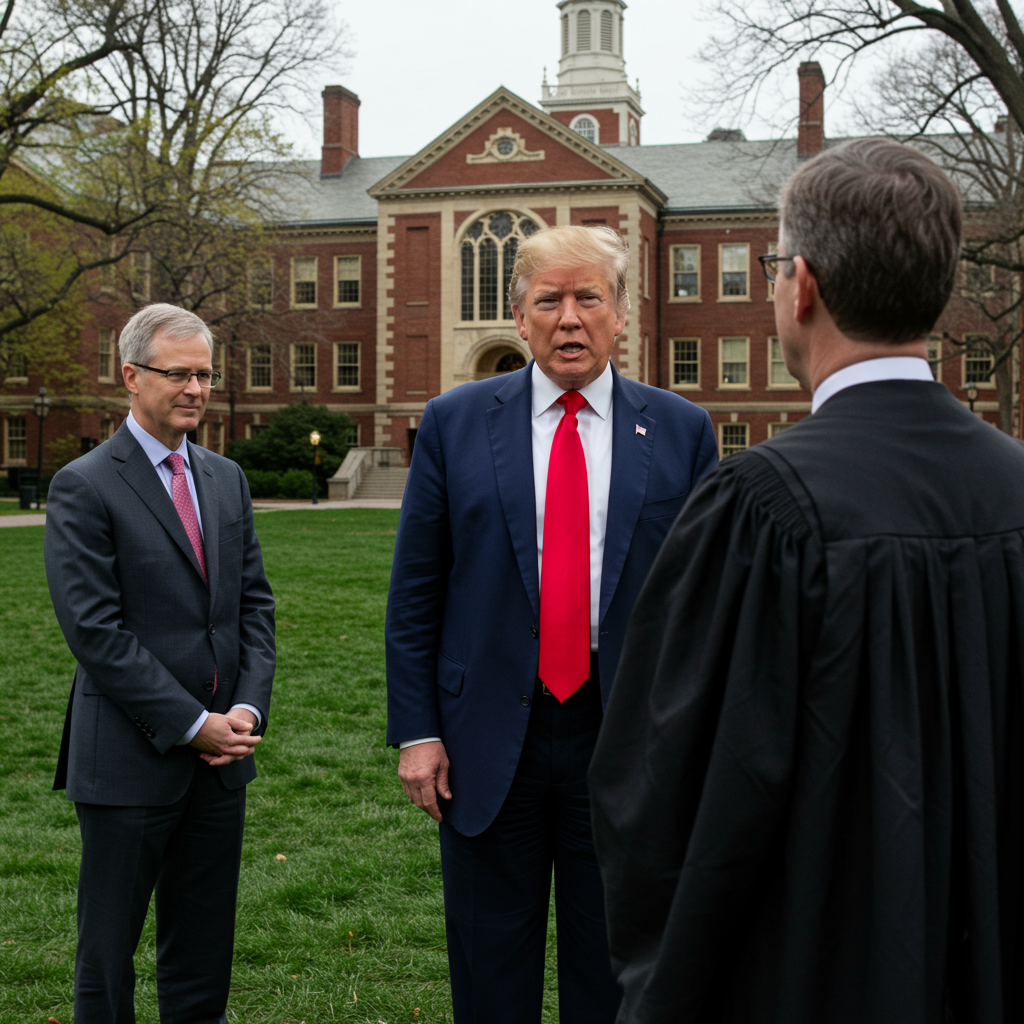The relationship between former President Donald Trump’s administration and elite American universities, particularly Harvard, devolved into a significant and aggressive confrontation. Described by some as a “frontal attack,” this campaign involved a rapid series of actions targeting one of the nation’s most prestigious—and wealthiest—higher education institutions. The repercussions of this intense pressure campaign are poised to have a lasting impact on the landscape of American higher education.
Over a short, intense period, the Trump administration initiated multiple measures against Harvard:
Threatening to redirect $3 billion in research funding, potentially diverting it to vocational schools.
Instructing federal agencies to review approximately $100 million in government contracts awarded to Harvard, with directives to “find alternative vendors” where feasible.
Freezing over $3 billion in existing federal research grants.
Attempting to suspend foreign students from enrolling or maintaining their visas at the university.
These moves represented a significant escalation in the politicization of universities, even if some faced immediate legal challenges that put them on hold.
Why the Attack on Harvard? Administration’s Justifications
While the administration offered several justifications for its actions, the most immediate stated cause stemmed from allegations that Harvard had failed to adequately address antisemitism on campus following widespread anti-Israel protests at universities across the US.
A pivotal moment cited by the White House was the December 2023 congressional testimony where then-Harvard President Claudine Gay, alongside other university leaders, struggled to provide a direct answer on whether calls for the “genocide of Jews” violated student conduct codes. Although President Gay later apologized, telling the student newspaper, “When words amplify distress and pain, I don’t know how you could feel anything but regret,” the incident fueled the administration’s focus.
Beyond antisemitism concerns, the administration also cited a perceived lack of conservative faculty at Harvard, concerns about admitting too many foreign students, and alleged financial links to China.
However, the administration’s demands on Harvard extended far beyond addressing campus safety regarding antisemitism. A letter reportedly from the administration’s “Joint Task Force to Combat Anti-Semitism” presented a broad list of required changes, including:
Terminating diversity programs.
Reforming admissions and hiring practices.
Screening foreign students for views deemed hostile to “American values.”
Expanding and protecting “viewpoint diversity” among students and faculty.
This comprehensive list suggested that the administration viewed Harvard, and perhaps elite higher education more broadly, as needing fundamental ideological reform.
A Broader War on Elite Higher Education?
Many observers saw the actions against Harvard as part of an “across-the-board war on elite higher education.” The intense, rapid pressure was described as a “shock-and-awe strategy” aimed at leveraging universities as “critical levers” for transforming society.
This perspective aligns with a long-standing conservative critique of American college campuses, viewing them as strongholds of liberal indoctrination rather than neutral grounds for the pursuit of knowledge. Conservative commentators, like Charlie Kirk of Turning Point USA, have argued that universities forcefully push a “left-wing world view” and need to be “shaken up.”
The sentiment is reinforced by polling data showing a distinct divide between college graduates, who tend to disapprove of Trump’s performance at higher rates, and non-college graduates, who show higher approval. Some analysts, like Rick Hess of the American Enterprise Institute, interpret this as blowback from the perception that elite universities have become closely aligned with “blue [Democratic] America.”
The pressure wasn’t limited to Harvard. Other prominent institutions faced similar scrutiny and financial consequences. Princeton and the University of Pennsylvania reported hundreds of millions of dollars in suspended research grants. The Department of Education launched investigations into numerous universities for alleged antisemitism and illegal race-based programs, warning dozens more they could face similar inquiries.
Experts note that American higher education has become increasingly reliant on and tied to government funding. While previous administrations used levers of control like civil rights investigations, the Trump administration was seen as turning these “up to 11,” often with fewer procedural safeguards, creating both an “evolution and a revolution” in the relationship between government and universities.
Universities Fight Back, Primarily in Court
Facing unprecedented pressure, Harvard actively resisted, primarily by utilizing the courts. Legal challenges became the university’s principal tool against the administration’s directives.
A significant victory for Harvard came when a federal judge, Allison Burroughs, indefinitely suspended the administration’s attempt to prohibit foreign students from receiving visas to attend the university. This decision upheld an earlier temporary restraining order and signaled the court’s intent to issue a longer-term injunction while the legal case proceeds. Harvard argued that the government’s action was illegal, unwarranted, and represented “clear retaliation” for the university exercising its First Amendment rights and refusing demands to control its governance and curriculum.
Harvard has also filed a lawsuit seeking to prevent the termination of over $2.2 billion in federal grants, a case that remains pending. The university argued in court filings that the administration was presenting a stark trade-off: allow the government to micromanage its academic institution or jeopardize its ability to pursue critical research in areas like medicine and science.
The administration’s actions and the ensuing legal battles have caused significant uncertainty and distress among Harvard’s substantial international student population (over 27% of total enrollment). These students faced concerns about their ability to study, graduate, and remain in the US, highlighting their feeling of being “pawns in a game.” Beyond the human impact, losing international students, who are often full-tuition payers, could significantly impact Harvard’s finances, which help subsidize financial aid for American students.
Despite the administration’s rhetoric and the support among Trump’s base, national opinion polls suggested a majority of the general population supported American universities and opposed the proposed funding cuts.
Lasting Consequences Beyond the Presidency
Experts disagree on the long-term effectiveness of the specific actions taken, with some viewing Trump’s approach as potentially less impactful than a more methodical restructuring might have been. However, there is significant concern about the potential damage to academic independence and the “chilling effect” on faculty and students.
Greg Wolfson of the American Association of University Professors expressed fears that a growing number of academics could self-censor political views or avoid controversial research, potentially undermining the “higher education project” in the country, regardless of court outcomes. He argued that the “destruction is real.”
Whether the administration’s specific directives ultimately succeed or fail in court, one consequence seems clear: American universities, particularly elite ones, are no longer insulated from the intense, partisan conflict of national politics. The confrontation has breached the “ivory tower,” leaving institutions exposed to a level of political pressure and scrutiny previously unimaginable, setting a precedent that could resonate long after the administration that initiated it.
References
- https://www.bbc.com/news/articles/c0ln9lexyedo
- https://www.bbc.co.uk/news/articles/c0ln9lexyedo
- https://www.bbc.com/news/articles/cx2jeg8zej8o
- https://www.bbc.com/news/articles/cje7ledqvyqo
- https://www.boston.com/news/politics/2018/09/19/no-way-out-us-china-tariffs-may-become-the-new-normal/


